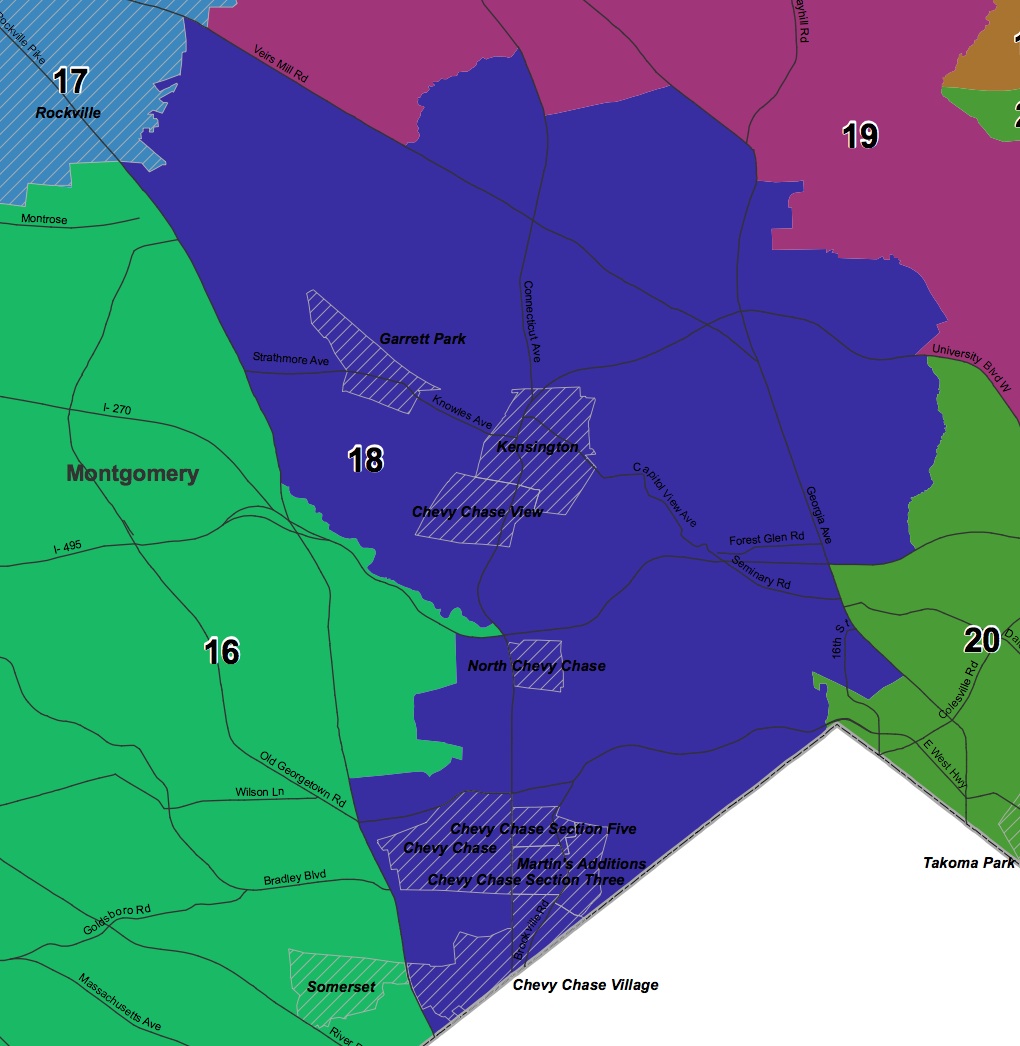 Al Carr, Ana Sol Gutiérrez, Jeff Waldstreicher, Emily Shetty, Natali Fani-Gonzalez, Elizabeth Matory, and Rick Kessler
Al Carr, Ana Sol Gutiérrez, Jeff Waldstreicher, Emily Shetty, Natali Fani-Gonzalez, Elizabeth Matory, and Rick Kessler
I live tweeted last night’s delegate debate hosted by the D18 Democratic Caucus. Not all went through as the Bushey Theater, formerly Roundhouse Theater, has no wifi and is almost a cell phone dead zone. Heaven for a theater but the enemy of the twitterati.
These events are great not because they change minds but because they give people a chance to know the candidates as real people and better understand what motivates them and where their real political passion lies.
DEBATE MOMENTS
Oblivious Conservatism on Education: Amazing to hear vocal criticism of basing education funding on a county’s wealth and support for directing it based on the number of students from candidates trying to outdo one another as the most progressive. So two counties with the same number of students should receive the same funds from the State even if one is twice as wealthy?
This populist railing against overcrowded schools will likely fly well with the voters. But conservatives will quite rightly roll their eyes at the incoherent pairing of this call for “fairness” with simultaneous demands for more taxes on the wealthy to pay for services for people striving their way up the ladder.
Smackdown! Moderator Charles Duffy saying to Jeff Waldstreicher “I guess we can move on if you’re not going to answer the question” after Jeff’s answer on school construction. Natali Fani-Gonzalez also took Jeff to task for expressing pride helping to bring an insufficient $40 million back to MoCo for school construction.
Boom. Liz Matory stated “our delegation in the House of Delegates is considered the weakest in the State of Maryland” in arguing her case for a new, more effective delegation. Direct contrast with Ana’s highlighting her seniority on the Appropriations Committee and Jeff doing the same on the Judiciary Committee.
New D18 Drinking Game: Drink when Rick Kessler says “ATM” or anyone says “bringing people together.” Seriously, I was getting worried that someone was going to break out singing “People. People who need people.”
Taxes and Economic Justice: Repeated calls for more taxes on high-income earners and big corporations in this district with some of the wealthiest precincts in the State, though also areas that need a hand. Much support for combined reported and closing the achievement gap. Liz Matory provided a contrast with her concern that current tax rates are making it more difficult to attract business to Montgomery.
No Discussion. Environment. Health Care.
CHALLENGERS
Natali Fani-Gonzalez Strengths: Unquestionably in command when she had the mike, Natali articulated a strong passion for economic justice backed by business and lobbying experience along with an inspiring personal story. Clear winner of the first half of the debate.
Elizabeth Matory Strengths: Forceful and willing to call it as she sees it and aware of the need to attract business to Maryland. Many with business experience sound arrogant and windy as they talk about how they’ll bring it to bear on government. Not Liz. She communicated well how she’d marry her business smarts to politics.
Rick Kessler Strengths: On message as any presidential candidate, Rick drilled into my head that Montgomery County should not be the State of Maryland’s ATM. Rick clearly gets that candidates must repeat, repeat, repeat to get their message across.
Emily Shetty Strengths: Harnessed her personal history effectively to help show the grounding for her agenda. Drove home her support for more money for schools in Montgomery. @AbeSaffer is her not-so-secret Twitter weapon.
INCUMBENTS
Al Carr Strengths: Calm and relaxed, Al sounds like a real person doing his best to work pragmatically on problems rather than a pol. He highlighted concrete achievements in making our state government more genuinely transparent despite opposition.
Ana Sol Gutiérrez Strengths: Still passionate after twenty years in elected office. No one gets to the left of Ana in a debate–not a bad place to be in the Democratic primary. A very American immigrant story that paved the way for others on the stage.
Jeff Waldstreicher Strengths: No constituent problem is too small. Proud to be Delegate Pothole, Jeff’s opening statement highlighted his success in getting the A/C turned on in a county facility so a Bar Mitzvah could move ahead even though his child was sick. Gave out his cell number.

